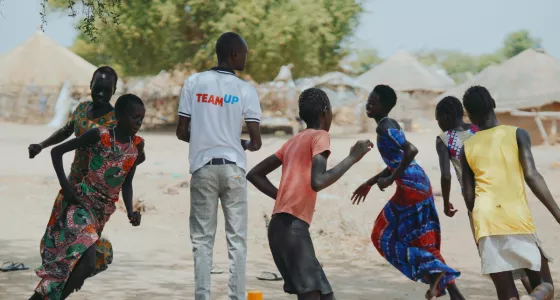When fighting reached her hometown, 12-year-old Adit’s life changed irreversibly. “Because of the war, we had to run. The rebels came and stole all our things,” she recounts.
Adit lost her father to a landmine explosion, and with her oldest brother imprisoned, she had few people to rely on. She also lives with a disability from an accident at home.
Upon arriving in a new place, Adit struggled to settle in and was bullied at school.
“The other children would call me ‘one leg’, I would fight with them, and I felt lonely.”
Adit joined TeamUp, War Child’s psychosocial support programme that helps children through movement-based activities such as sports and dance. These sessions bring children together to relieve stress and tension while helping them process their trauma.
Led by trained local facilitators, each activity has a specific goal related to themes such as managing anger or stress and interacting with peers. Activities are designed to be inclusive, using play and movement rather than verbal communication to ensure participation from all children, regardless of language barriers.
“After school, I join TeamUp. Together we play, and I make new friends. It’s good to have friends because they can help you with your problems. Together with my friends, I play many games.
I like our facilitators a lot. They are good leaders, and we do things we really enjoy. They make me feel safe and happy.
Other children should also take part in TeamUp. It’s good for them to learn to play together, like I have. Now the other children respect me.”
Despite her experiences, it’s clear from the moment you meet Adit that she possesses an inner strength. Children are extremely resilient, but they need the opportunity to process the trauma they have experienced through programmes like TeamUp.



